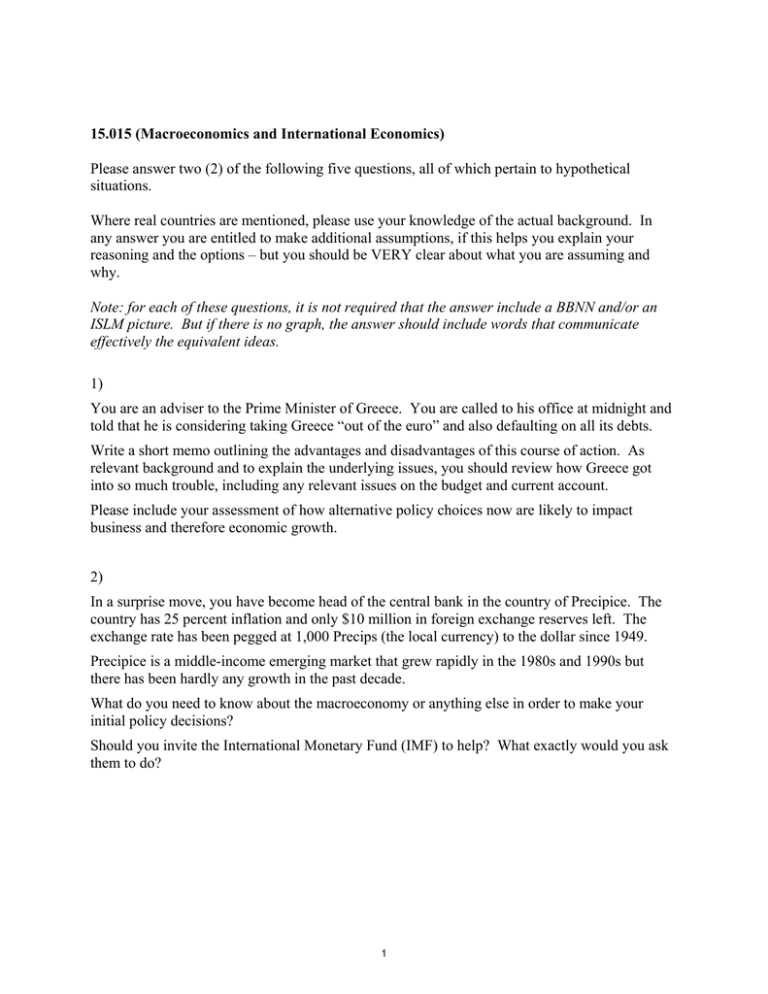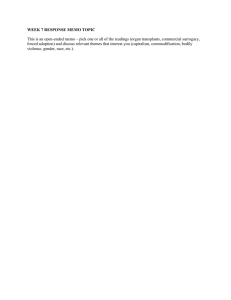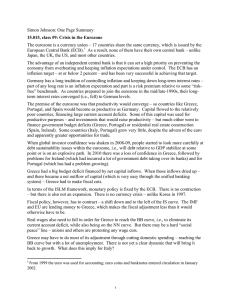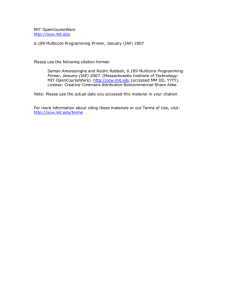Please answer two (2) of the following five questions, all... situations. 15.015 (Macroeconomics and International Economics)
advertisement

15.015 (Macroeconomics and International Economics) Please answer two (2) of the following five questions, all of which pertain to hypothetical situations. Where real countries are mentioned, please use your knowledge of the actual background. In any answer you are entitled to make additional assumptions, if this helps you explain your reasoning and the options – but you should be VERY clear about what you are assuming and why. Note: for each of these questions, it is not required that the answer include a BBNN and/or an ISLM picture. But if there is no graph, the answer should include words that communicate effectively the equivalent ideas. 1) You are an adviser to the Prime Minister of Greece. You are called to his office at midnight and told that he is considering taking Greece “out of the euro” and also defaulting on all its debts. Write a short memo outlining the advantages and disadvantages of this course of action. As relevant background and to explain the underlying issues, you should review how Greece got into so much trouble, including any relevant issues on the budget and current account. Please include your assessment of how alternative policy choices now are likely to impact business and therefore economic growth. 2) In a surprise move, you have become head of the central bank in the country of Precipice. The country has 25 percent inflation and only $10 million in foreign exchange reserves left. The exchange rate has been pegged at 1,000 Precips (the local currency) to the dollar since 1949. Precipice is a middle-income emerging market that grew rapidly in the 1980s and 1990s but there has been hardly any growth in the past decade. What do you need to know about the macroeconomy or anything else in order to make your initial policy decisions? Should you invite the International Monetary Fund (IMF) to help? What exactly would you ask them to do? 1 3) A candidate for the Republican nomination (i.e., someone currently competing to become the presidential candidate) just said the following on CNBC: “The United States can run a large current account deficit for the indefinite future. Not only that, but there is no practical limit to the amount of debt the federal government can have. We should cut taxes across the board to get the economy back on track.” You work for a different Republican candidate. Write a memo summarizing the strong and weak points of the above statement and make a recommendation for how your candidate can respond. 4) You are considering investing in China, but your board of directors is concerned about the macroeconomic and financial situation there. Specifically, key directors argue that China is following the path of Japan – meaning that it will soon have a financial crisis and then experience “two lost decades.” Outline a short presentation that would explain (a) what happened in Japan, (b) your view on whether this or something worse can happen in China. Given that no one has full information about all relevant developments in China, please mention explicitly what exact warning signs you and the board should look for. 5) At their next summit meeting, the Secretary General of the United Nations wants to tell the G20 heads of government that they face the prospect of “another Great Depression,” unless they adopt dramatically different policies. He will have 5 minutes to make his case, so this needs to be done in effective manner. Please sketch the main points he should make, both with regards to what could go wrong and what policies should now be pursued – and by whom. The Secretary General is Korean, so you should try to use the Korean experience in 1997-98 (and afterwards) as a reference point. 2 MIT OpenCourseWare http://ocw.mit.edu 15.015 Macro and International Economics Fall 2011 For information about citing these materials or our Terms of Use, visit: http://ocw.mit.edu/terms. 3 6





